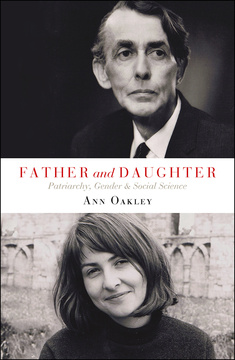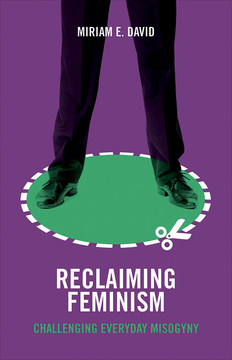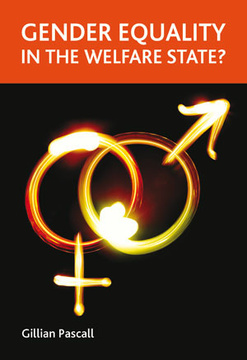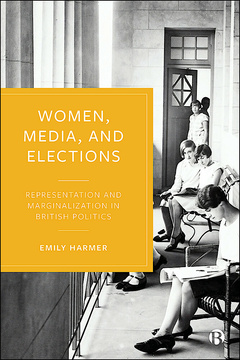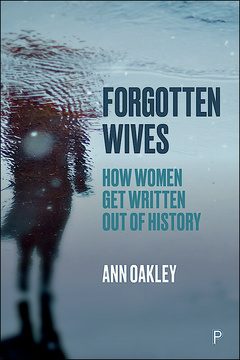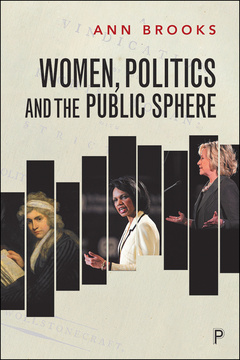Published
Mar 13, 2019Page count
368 pagesISBN
978-1447332626Dimensions
216 x 138 mmImprint
Policy PressPublished
Mar 8, 2018Page count
368 pagesISBN
978-1447332565Dimensions
216 x 138 mmImprint
Policy PressPublished
Mar 8, 2018Page count
368 pagesISBN
978-1447332602Dimensions
Imprint
Policy PressPublished
Mar 8, 2018Page count
368 pagesISBN
978-1447332619Dimensions
Imprint
Policy PressWatch Ann Oakley talk about women from the book on our YouTube channel
In the media
'What did women really want? Writing a suppressed history of social reform' in Discover Society
'Women, Peace and Welfare: A Suppressed History of Social Reform, 1880-1920, by Ann Oakley' in Times Higher Education
On our blog: 'Our inspiring women for International Women’s Day 2018'
Between 1880 and 1920 many women researched the conditions of social and economic life in Western countries. They were driven by a vision of a society based on welfare and altruism, rather than warfare and competition.
Ann Oakley, a leading sociologist, undertook extensive research to uncover this previously hidden cast of forgotten characters. She uses the women’s stories to bring together the histories of social reform, social science, welfare and pacifism.
Her fascinating account reveals how their efforts, connected through thriving transnational networks, lie behind many features of modern welfare states and reminds us of their powerful vision of a more humane way of living – a vision that remains relevant today.
“What distinguishes this new account...is that, whereas in many earlier studies the ideas and achievements of women have been portrayed as playing an important, but nonetheless largely subaltern, role in the wider evolution of the period, Ann Oakley’s gripping narrative centres upon reform movements, scientific innovations and philosophical systems in which many of the major protagonists of change were themselves members of the female sex” Journal of Social Policy (Cambridge University Press)
“Few books can boast of the right author meeting the right subject. Here is a glorious exception, which is part of Oakley’s life work of refocusing the lens so that the role of women in establishing the welfare state is fully and justifiably recorded.” Frank Field, MP
"A new book by Ann Oakley is always a landmark event and this one on the ‘dangerous women’ of reform is irresistible. Read in one sitting, I’d like a sequel please!" Liz Stanley, University of Edinburgh
"This illuminating, erudite book is a must read for those seeking to know more about women social reformers in the past." June Purvis, University of Portsmouth
"History books usually tell us that the world was made by men. Ann Oakley, with her dedication to social research, has shone a light into the lives of women who helped make the world." Baroness Jean Corston
“Brilliantly uncovers the extraordinary contributions to social reform and to campaigning for peace by women mostly forgotten by history. Many of these challenges to convention are still relevant today” Baroness Tessa Blackstone
"A magnificent book" Times Higher Education
“A beautiful tale of hundreds of “difficult” and all-too-often forgotten women imagining and working for a more just world. In the telling, a vibrant network of reformers, social workers, and social scientists comes alive.” Leila J. Rupp, author of Worlds of Women: The Making of an International Women’s Movement
"Oakley reveals in depth many near-forgotten women as they fought to right the multiple wrongs created by a male-dominated political culture and to create a better world." Patricia M. Thane, King's College, London
Ann Oakley is Professor of Sociology and Social Policy at the UCL Social Research Institute. A social researcher for more than 50 years, and author of many academic publications, she is also well known for her biography, autobiography and fiction. Her books include The Sociology of Housework, From Here to Maternity and The Men's Room which was serialised by the BBC in 1991, and most recently Women, Peace and Welfare (Policy Press, 2018).
Legacies of difficult women: the story of this book;
Imagining the good society: from economic facts to utopian fictions;
Settlement sociology: discovering social science;
Municipal housekeeping: women clean up the cities;
Sanitary science: putting the science into housework;
'Peace is too small a word for all this': women peace makers;
'Our cosmic patriotism': diversity and the dangers of nationalism;
Deeds, not words: women reformers and healthcare;
Dangerous trades: reforming industrial labour;
Domestic relations: female attachments, homes, and the trouble with marriage;
New deals: women reformers in the 1920s and 1930s;
Ways of forgetting: women reformers as missing persons.











